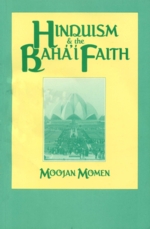
|
Abstract: An attempt to explore the relationship between Hinduism and the Bahá'í Faith and to explain the Bahá'í Faith to those who are from a Hindu background. Notes: Mirrored with permission from www.momen.org/hinduism. |
| single page | chapter 1 |  |

Contents
|
Introduction
Hinduism
Hinduism is not merely a religion; it is a collection of religious traditions.
These various strands of Hinduism are linked together as far as their concepts
and history are concerned. But they have evolved in such a manner that
they now present a wide variety of views about most matters. The ideas
of some groups even contradict those held by other groups. It is hard to
find any concepts or doctrines about which all the strands of Hinduism
are agreed. There are, however, a number of important concepts about which
most of the different strands in Hinduism have something to say - even
if they do not agree about them. Among these are the following:
Brahman
It is agreed among almost all Hindus that Brahman (Brahma) is the Absolute
Reality or the supreme deity in the cosmos. Those that follow the Vedanta
prefer to think of Brahman in an impersonal way as Absolute Reality. And
so each soul (atman, atma) is part of Absolute Reality, if only
human beings could see things as they really are. On the other hand, those
Hindus that follow the theistic traditions prefer to think of Brahman as
a personal God. Among these Hindus, Brahman becomes Bhagwan or Ishvara,
the Lord. In each strand of the theistic tradition, this is developed in
a different way. In Vaishnavism, it is the god Vishnu who manifests Brahman;
while in Shaivism, the god Shiva manifests Brahman.
Dharma
It is not possible to translate the word Dharma into English
in such a way as to represent all of its meanings. These include: the universal
law, the right way of living, the moral order. At the cosmic level there
is the Sanatana Dharma. This is the eternal, unchanging, universal
law which governs the universe and to which all things conform. At the
level of man, there is firstly the Sadharama Dharma. This is the
general code of ethics. It includes the requirement to perform good deeds
(such as going on pilgrimages and giving to charity) and also prohibits
evil deeds (such as causing injury and lying). Secondly, there is the Varnashrama
Dharma. This is the customs and duties relative to each person's caste,
as well as the social duties relative to the stages in each person's life
as set out in Hindu Scripture (study of the scripture, raising of a family,
retiring from family life, and the wandering mendicant). There is also
a personal meaning to Dharma. Everyone has his own personal Dharma,
the right way for him to live.
Samsara and Reincarnation
The world is the source of all suffering and grief (dukkha).
Many Hindus consider that human beings are locked into a cycle of repeated
rebirths (samsara) into this world, and so there is continual exposure
to
dukkha. However, reincarnation is not a unanimous belief among
Hindus. Many of the greatest movements in modern Hinduism, including the
Brahmo Samaj and the Prarthana Samaj, reject it.
Moksha (liberation)
The way out of the cycle of rebirths is moksha (liberation). How to achieve this has been of central concern to Hinduism for thousands of years. Needless to say, there is no way of achieving it that is agreed upon by all. But the ways that have been suggested can be divided into three main groups:
a. Karma (the way of works) This refers to a constant control over all of one's actions so that one is always acting in accord with Dharma. This involves not only the duties of one's caste but also the wider moral obligations to be found in the Sadharama Dharma.
b. J?ana (enlightenment) It is avidya (ignorance) or maya (illusion) that prevents man from knowing what is real and what is unreal - especially with regard to that part of himself that is immortal. Through a number of means, such as yoga, man is able to distinguish between what is real and what is not. This enables him to realize his own immortal self and so achieve moksha. This way is followed in particular by the Advaita Vedanta and other schools of speculative philosophy.
c. Bhakti (loving devotion) This is the path of total surrender
to the Lord. Its ideal is the state of constantly remembering the Lord
through devotions, prayer and meditations. But those that follow this path
do not look solely to themselves for salvation. They believe God to be
kind and full of grace. And so they look to God to lift the burden of their
sins, for God's grace is able to override the laws of karma.
The Bahá'í Faith
Bahá'ís believe that the Bahá'í Faith does not come not to supplant Hinduism. Rather its aims are:
- to take Hinduism on to a further stage of its evolution;
- to resolve some of the differences that we have noted above;
- and above all to unite Hinduism.
In the next few chapters we will examine the philosophy and the ethical Dharma in both Hindu and Bahá'í belief. This will enable us to see that there is no conflict between the two. Indeed we will see that the Bahá'í position resolves some of the disagreements in philosophy that exist between the various schools within Hinduism.
In the later chapters, we will describe the social teachings of the Bahá'í Dharma. We will examine the Bahá'í claim that this will take Hinduism on to a further stage of its evolution. Bahá'ís believe that they will bring this about by reforming those elements that are no longer suited to the social conditions of today and by renewing the spiritual force that is inherent in all mankind.
| single page | chapter 1 |  |
|
|